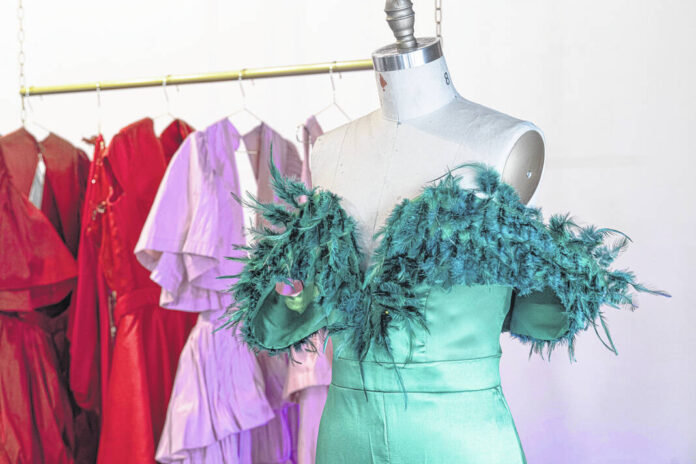PHILADELPHIA — Prajjé Oscar Jean-Baptiste was such the fan favorite on Bravo’s Project Runway, producers asked the Philly-based designer to join 13 Runway alumni and return to the cutting floor for a special 20th anniversary season of Project Runway All Stars.
The first part of the two-episode season premiere aired Thursday. Elle editor in chief Nina Garcia; designer Brandon Maxwell; and author and motivational speaker Elaine Welteroth will return as judges; season 4 winner Christian Siriano will serve as the designers’ mentor. Guest judges on this year’s installments of the Emmy-winning reality show include Hollywood A-listers Alicia Silverstone, Lena Waithe, and Billy Porter.
“It’s a room full of legends for God’s sake,” Jean-Baptiste, 39, concluded with dry matter-of-factness in the All Stars trailer.
Runway designers competed for a $250,000 prize, a mentorship with the Council of Fashion Designers of America, and a feature in Elle magazine.
Jean-Baptiste, who was born in Haiti and is a Massachusetts College of Arts and Philadelphia Fashion Incubator graduate, fared well on Runway’s 19th season, winning the streetwear challenge and scoring in the top three for several of them. Jean-Baptiste was eliminated in the ninth episode after the sleeveless frock he fashioned from doilies for the unconventional cocktail challenge disappointed judges. Post Runway, he’s become a local fashion celebrity, opening an atelier in Northern Liberties’ Crane Arts Building, where he designs extravagant silk ball gowns with seductive cutouts and Swarovski crystals. Some of his biggest clients include Kenny Gamble’s wife, Fatima, and Usher’s ex-wife, Grace Harry, who has been romantically linked with Roots drummer Questlove.
He filmed All Stars last fall. After he returned to Philly, he produced Jean-Michel, Chevalier De MCMXC, a gender neutral streetwear collection boasting patent leather outwear in candy colors, floral dresses with asymmetrical cuts, and evening gowns that sparkle with graffiti. Jean-Baptiste paired his confections with sequined baseball caps and platform sneakers.
“I was inspired by the art, music, and fashion of the 1990s with a strong focus on the legacy of [artist] Jean-Michel Basquiat and [18th-century fencer, violinist, and composer] Joseph Bologne,” Jean-Baptiste said. “It’s Black heritage on acid.”
I chatted with Jean-Baptiste about his Runway experience, his Haitian heritage, and why he thinks Philadelphia is a fashionable city.
Answers have been edited for clarity.
How does your Haitian culture impact your collection?
My first major collection was called Erzulie. There are two goddesses named Erzulie in Haitian culture: Erzulie Dantor, the patron saint of the LGBTQ community, the artists, and the laborers. And there is also Erzulie Freda, she represents luxury. My first major collection paid homage to these two spirits. They were very glamorous gowns in shades of pink and red that told the story of these Haitian queens and how my people honor them.
What lessons did you learn from your first Runway experience that you brought to All Stars?
I learned to stop second-guessing myself and to trust my instinct. I made all of my mistakes on Runway when I didn’t follow my gut. I tried to please the judges instead of pleasing myself, and they changed what they wanted from one day to the next. I lived in my head the whole time. I never settled into being there. I never even unpacked my bag. I was just so unsure. I went into this experience knowing full well who I was, what I could do, and what I wanted to do.
You always have such a diversity of models in your collection — why is this so important to you?
At this point in my career, following the industry standards just doesn’t interest me. After so many years in this business, I see how models are treated, specifically how people of color, plus-size models, and people with [the skin condition] vitiligo are treated. The older I get, the more I realize that these are the people I want to see in my clothes. I am not the industry standard. I’m a weirdo and it’s weirdos who have built my village and help me build my name. Every woman in my family has a large backside, huge breasts and is big and beautiful. I have built up my name and I have a little bit of credibility in the business so I’m going to use my platform to honor who I want to see on the runway.
What does Philly need to do to put its fashion designers on the map?
Philly designers need to learn how to follow fashion industry production standards. There needs to be places where they can go and learn about the fashion calendar. Philly designers need training, resources, education, and funding and it’s not cheap. We need more high-end stores that are willing to show local designers’ work.
What do Philadelphians do well when it comes to fashion?
Philly has the most incredible streetwear scene, especially their sneaker game. Philly people aren’t willing to compromise their identity for who they are when it comes to fashion. And everything they do, they do it at 100. If they are into beads, then heck, they are wearing beads and you can feel the energy of those beads. In New York, everyone wears black. But here, people look like a bag of Skittles and that is the world where I want to live. You go to barbecues and people will come out in gowns in Philly. That is impressive. That is fashion.







